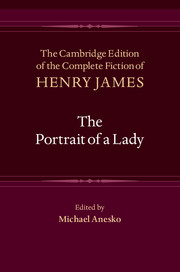Book contents
- Frontmatter
- Contents
- List of Illustrations
- Acknowledgments
- List of Abbreviations
- General Editors’ Preface
- General Chronology of James’s Life and Writings
- Introduction
- Textual Introduction
- Chronology of Composition and Production
- Bibliography
- The Portrait of a Lady
- Glossary of Foreign Words and Phrases
- Notes
- Textual Variants
- Emendations
- Appendices
Chapter 19
Published online by Cambridge University Press: 11 April 2021
- Frontmatter
- Contents
- List of Illustrations
- Acknowledgments
- List of Abbreviations
- General Editors’ Preface
- General Chronology of James’s Life and Writings
- Introduction
- Textual Introduction
- Chronology of Composition and Production
- Bibliography
- The Portrait of a Lady
- Glossary of Foreign Words and Phrases
- Notes
- Textual Variants
- Emendations
- Appendices
Summary
AS MRS. TOUCHETT had foretold, Isabel and Madame Merle were thrown much together during the illness of their host, and if they had not become intimate it would have been almost a breach of good manners. Their manners were of the best; but in addition to this they happened to please each other. It is perhaps too much to say that they swore an eternal friendship; but tacitly, at least, they called the future to witness. Isabel did so with a perfectly good conscience, although she would have hesitated to admit that she was intimate with her new friend in the sense which she privately attached to this term. She often wondered, indeed, whether she ever had been, or ever could be, intimate with any one. She had an ideal of friendship, as well as of several other sentiments, and it did not seem to her in this case—it had not seemed to her in other cases—that the actual completely expressed it. But she often reminded herself that there were essential reasons why one's ideal could not become concrete. It was a thing to believe in, not to see—a matter of faith, not of experience. Experience, however, might supply us with very creditable imitations of it, and the part of wisdom was to make the best of these. Certainly, on the whole, Isabel had never encountered a more agreeable and interesting woman than Madame Merle; she had never met a woman who had less of that fault which is the principal obstacle to friendship—the air of reproducing the more tiresome parts of one's own personality. The gates of the girl's confidence were opened wider than they had ever been; she said things to Madame Merle that she had not yet said to any one. Sometimes she took alarm at her candour; it was as if she had given to a comparative stranger the key to her cabinet of jewels. These spiritual gems were the only ones of any magnitude that Isabel possessed; but that was all the greater reason why they should be carefully guarded. Afterwards, however, the girl always said to herself that one should never regret a generous error, and that if Madame Merle had not the merits she attributed to her, so much the worse for Madame Merle. There was no doubt she had great merits—she was a charming, sympathetic, intelligent, cultivated woman.
- Type
- Chapter
- Information
- The Portrait of a Lady , pp. 180 - 198Publisher: Cambridge University PressPrint publication year: 2016

